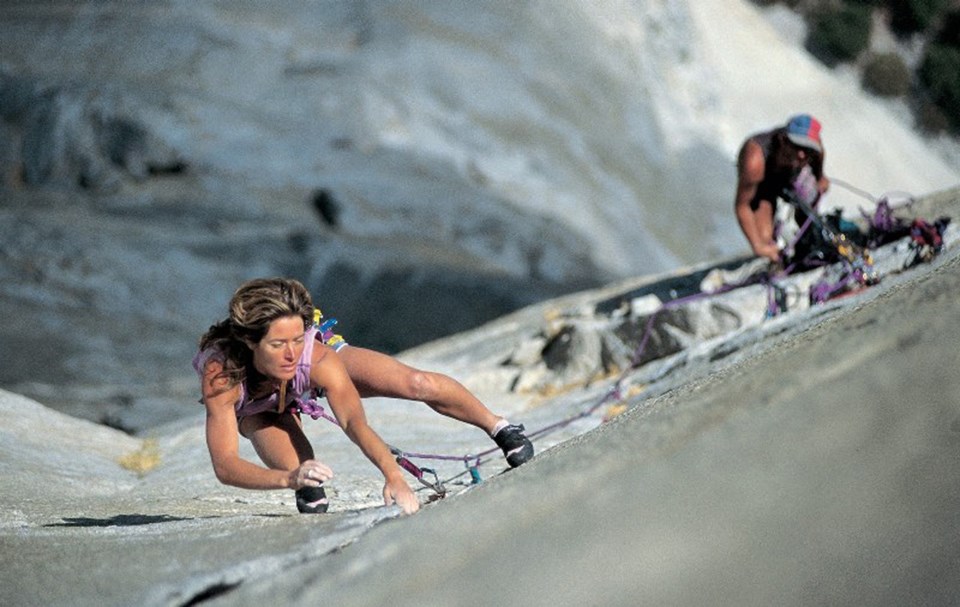Lynn Hill is the guest speaker at Women Rock, Wednesday, Feb. 17, 7:30 p.m. at Centennial Theatre, 2300 Lonsdale Ave., North Vancouver. Part of the Vancouver International Mountain Film Festival. Visit vimff.org for tickets and info.
Before Lynn Hill discovered the hulking rock formations of Southern California, she was happily clambering up trees and lampposts in her Orange County neighbourhood.
It was the early-1970s and rock climbing was still a relatively unknown sport in America, but Hill's older sister and her sister's boyfriend had recently taken up the fringe activity. The pair were learning techniques from rock climbing pioneer Royal Robbins' book, Basic Rockcraft, one of the first instructional climbing manuals available.
"Kinda sketchy, but it worked," Hill says. "I think the drawings were pretty good."
Recognizing Hill's natural climbing ability, the couple invited the 14-year-old to tag along on one of their excursions in 1975.
"I just loved that kind of movement, and they could tell, and so they took me out one day and that was pretty much the beginning of that story," she says.
When Hill turned 16, she got her first car and started driving herself out to Joshua Tree National Park on weekends. There, she met other climbing enthusiasts and was integrated into the Stonemasters, a small band of long-haired, bandanawearing adventurers.
"We were just a loose collection of climbers that would meet on the weekends," Hill explains.
The group was known for their free-spirited lifestyle, minimal use of equipment, and unwritten code of ethics that pushed the standards of free climbing. Routes were to be completed from the ground up and there was no "hang dogging" allowed, meaning you could not hang on the rope to pause and rest. "Back in the day, you were supposed to pretend that the rope didn't exist. If you touched it and used it for equipment that was considered aid and that was the evil sin of free climbing. You're supposed to free climb it as if there was no rope."
Now living in Boulder, Colorado, Hill has been rock climbing for 40 years and is among the best-known climbers in the world. She was a successful competitive sport climber from the late-'80s into the early-'90s when she retired from competition and resumed traditional rock climbing. Her most notable achievements include the first free ascent of the legendary Nose on El Capitan in the Yosemite Valley in 1993, followed by a one-day free ascent of the Nose in 1994. Those feats remained unrepeated for more than a decade.
Climbing has taken Hill all over the world, to destinations in Europe, Vietnam, Thailand, Morocco, Australia, Japan, Kyrgyzstan, Cuba and China. In 2002, she recounted her biggest triumphs and tragedies in an autobiography entitled Climbing Free: My Life in the Vertical World.
Back in the '70s, when Hill was introduced to rock climbing, there were few other women pursuing the activity. A long-time proponent for gender equality in rock climbing, she's been pleased to see the demographics change over the decades.
"It's nice to see that there's a lot more women," she says. "They're really strong. It's impressive to see what the women can do today and they're closing the gap, so that's satisfying for me to see."
"People would say that this is a sport that requires upper body strength. And that's true, to some degree, but a woman can have a high strength-to-weight ratio which helps a lot," she continues. "There's so much more involved in climbing - a lot of it is psychological."
While there are certainly more female rock climbers today than there were 40 years ago, there are also a lot more rock climbers in general.
"It's become kind of a cool thing to do now instead of this weirdo thing to do," Hill says.
People have caught on to the health and body sculpting benefits of the sport and indoor climbing gyms are now easy to find. It's a different picture from her teenage years when she and her friends would have been considered non-conformists.
"Back when I first started, we were not really interested in following mainstream because mainstream seemed to be about things that were the opposite of the beauty of climbing - it was about having stuff, having material wealth - things that don't have anything to do with nature and relying on yourself."
Today, in popular climbing areas, people have to jockey to find parking spots and open climbing routes, she says. Bigger crowds have brought in more rules as well as more environmental and safety concerns.
"And so it's much more regulated than it's ever been, but it has to be because there's more people."
The growing popularity of rock climbing hasn't dissuaded Hill from engaging in the sport, which continues to challenge her physically and mentally.
"It's so multi-faceted that it's a part of my lifestyle.
It's not just a sport - it's a lifestyle" that includes travel, camaraderie and an appreciation for the natural environment, she says.
"And I can't think of a better way to evolve as a person than to be trying to adapt to nature itself and its forms and features."
In addition to Lynn Hill's talk, the VIMFF Women Rock event will include the screening of three films about female rock climbers: Golden Gate, Transition, and Women's Speed Ascent.



